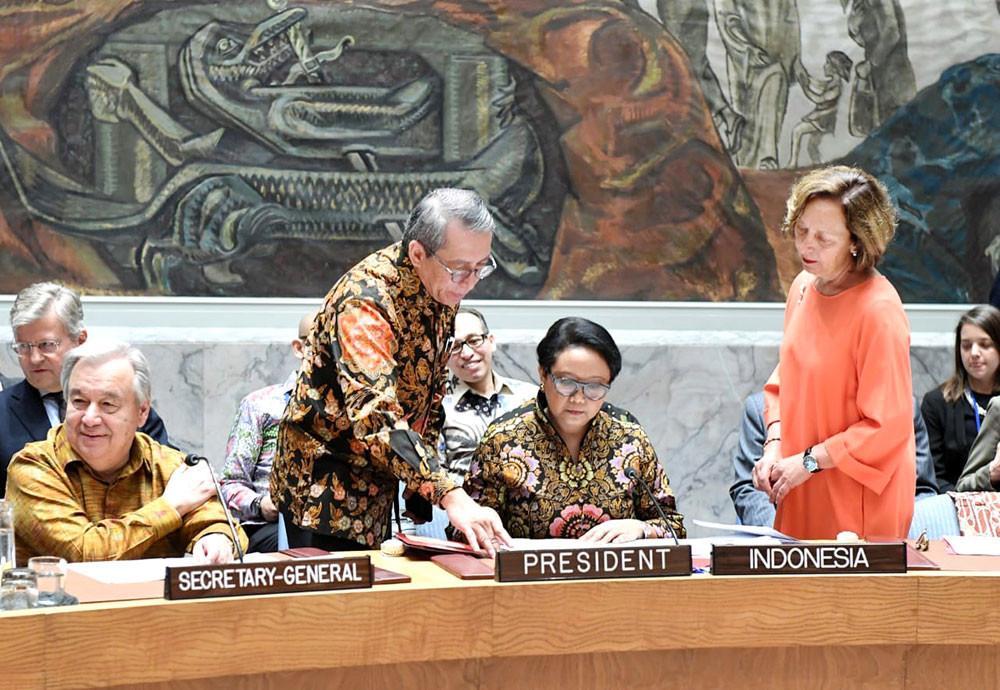Popular Reads
Top Results
Can't find what you're looking for?
View all search resultsPopular Reads
Top Results
Can't find what you're looking for?
View all search resultsIndonesia ends UNSC presidency with focus on peacekeeping
Change text size
Gift Premium Articles
to Anyone
 Indonesia's permanent representative to the United Nations, Dian Triansyah Djani (second left), speaks to Foreign Minister Retno Marsudi (second right) with UN Secretary-General António Guterres (left) sitting nearby, during an Indonesia-chaired UN meeting in New York last year. (The Jakarta Post/Agnes Anya )
Indonesia's permanent representative to the United Nations, Dian Triansyah Djani (second left), speaks to Foreign Minister Retno Marsudi (second right) with UN Secretary-General António Guterres (left) sitting nearby, during an Indonesia-chaired UN meeting in New York last year. (The Jakarta Post/Agnes Anya )
T
he adoption of a United Nations Security Council (UNSC) resolution that aims to empower women peacekeepers marked the end of Indonesia’s month-long council presidency in August, as the nation entered the last stretch of its two-year term on the esteemed global body.
The UNSC adopted Resolution 2538 (2020) regarding female personnel in UN peacekeeping missions on Aug. 28 by consensus.
“Resolution 2538 [2020] is the first resolution in the history of Indonesian diplomacy [to be adopted by] the UN Security Council,” Foreign Minister Retno Marsudi said over the weekend.
“At the same time, this is proof of Indonesia’s contribution to enhancing the role of women as agents of peace.”
The main elements contained in the resolution include the need to increase the number of female personnel in UN missions, training cooperation; the establishment of networks and databases for female personnel; enhancing safety and security and providing special facilities for female personnel; and initiating UN cooperation with regional organizations on the matter.
"Support for this Indonesian initiative is inseparable from Indonesia's diplomacy, credibility and track record in UN peacekeeping missions," Retno said.
Women constitute just over 6 percent of the total UN peacekeeping force today, the shortfall derives from the low proportion of female peacekeepers deployed by troop-contributing countries, including Indonesia.
Of the 5,327 women currently working in UN peacekeeping missions, just 158 are Indonesian.
They are deployed across seven UN peacekeeping operations: in Lebanon (UNIFIL), the Democratic Republic of Congo (MONUSCO), the Central African Republic (MINUSCA), South Sudan (UNMISS), Darfur (UNAMID), Mali (MINUSMA) and Western Sahara (MINURSO).
Since 1999, Indonesia has sent more than 570 female personnel to various UN peacekeeping missions.
While the UN encourages countries to deploy a force that is at least 15 percent female, the figure for women in Indonesia’s peacekeeping contingent still hovers below 5 percent, according to official sources.
The Indonesian government is working to raise this ratio to 10 percent.
In recent years, peacekeeping has gained a notorious reputation for incidents of sexual violence committed by peacekeepers against civilians, including reports of peacekeepers bartering humanitarian aid for sex. Over 200 people reported sexual violence and exploitation committed by UN personnel in 2018, according to a 2019 report by the UN secretary-general’s office.
Read also: Why there are so few women in UN peacekeeping
The issue has become a priority in Indonesia’s multilateral diplomacy agenda under Retno, the nation’s first female top diplomat.
It was also the first time that the UNSC has passed a resolution specifically addressing the issues faced by women in peacekeeping. Initiated by Indonesia, the draft resolution was cosponsored by all members of the council and dozens of other UN member states.
As UNSC president, Indonesia led meetings and convened general debate sessions and other fora, as well as facilitating reports and exchanges of information on behalf of the council.
The nation also assumed the presidency of the council in May last year, nearly a year after it was elected to serve as a nonpermanent member for the 2019-2020 period.
In the last week of its presidency, Indonesia held conference meetings on international peace and security caused by terrorist acts and on the Middle East conflict, as well as an Arria formula meeting on cybersecurity.
Under its leadership, the UNSC also passed on Aug. 28 a resolution to extend the mandate of UNIFIL and another resolution on the UN mission in Somalia (UNSOM).
It also conducted “sofa talks”, informal discussions to find common ground between opposing views on various controversial issues in the UN body. It is a new format that Indonesia initiated, where members meet without an agenda and without meeting records.
“Indonesia has contributed both intellectually and to the improvement of working methods at the UNSC in seeking out breakthroughs on issues that have been difficult to discuss,” said Grata Endah Werdaningtyas, the ministry’s director for international security and disarmament.
“By presenting a ‘sofa talk’ format, for instance, we are inspired by the spirit of mutual cooperation and a culture of working things out as a family that is characteristic of Indonesian society,” she said.
As a "middle power" in Asia, Indonesia continually seeks to leverage itself as the world’s third-largest democracy and the largest economy in Southeast Asia, among other things, in line with the constitutional mandate of maintaining global peace.
The nation ranks seventh in terms of diplomatic influence, according to the 2019 Lowy Institute’s Asia Power Index.









